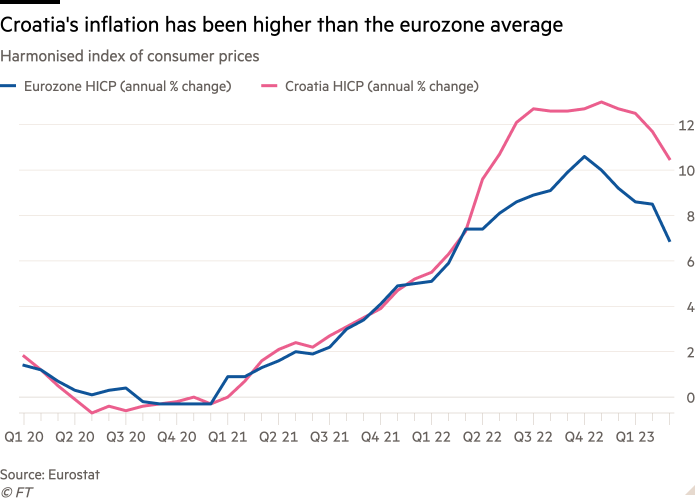Croatia’s central bank governor has batted away complaints that the introduction of the euro has led businesses to increase their prices substantially, saying its adoption had only raised costs “a little”.
Boris Vujčić told the Financial Times the country’s decision to become the eurozone’s 20th member in January had led to higher prices for takeaway coffee and men’s haircuts. However, he said the overall cost of living had hardly budged.
“We can now say with confidence that the impact of the euro introduction was not significant on prices,” said Vujčić, who added that it pushed prices up by 0.4 percentage points at most.
When other countries adopted the euro it often led to howls of protest from consumers, who argued that businesses used it as an excuse to raise prices. Critics in Germany invented the word “Teuro” to describe the phenomenon in an adaptation of teuer, which means expensive in German.
It has been a similar story in Croatia, which joined the bloc at a time when inflation was already at double-digit levels.

The country is also poorer than many European countries — its gross domestic product per capita was half the EU average in 2021, according to the World Bank — meaning people are more exposed to price rises.
“A lot of my friends are upset,” said Andrea, a waitress at a small Italian café a few streets from the white stone columns of the central bank in Zagreb. “They preferred the kuna. I think they imagine a lot of this, but many of them blame it for the high prices.”
Aware of the risk of public discord, the country’s economy minister, Davor Filipović, warned retailers against “trying to cheat Croatian citizens”.
In the first two weeks of euro usage, inspectors imposed a total of €234,000 in penalties to companies for unjustifiable price rises. The government also capped the price of eight essential goods from sugar to chicken, requiring shops to display the cost of goods in both kuna and euro until the end of this year.
The central bank tracked prices of restaurants and cafés by “web-scraping” data from Wolt, the delivery service, and checked shifts in the online prices of thousands of other items.
Only 10 per cent of prices at big retailers rose after the euro’s introduction, while a quarter fell and 65 per cent were unchanged, according to a blog by officials at the Croatian central bank and European Central Bank.
Vujčić, who celebrated the smooth launch of the currency with staff over a euro-shaped cake and champagne, said some of the biggest price increases had been in hairdressers, coffee shops and beauty parlours. “That’s where people rightly feel prices have gone up,” he said.
However, officials also found that some price increases in January were reversed a few weeks later. “Some guys who increased prices too much, they found people don’t want to buy their coffee so they started to reduce it.”
Markets were “still alive and they still work”, he said.
The euro traded at 7.5 kuna before the switch to the common currency.
Before the switch, Croatian retailers priced most items at psychologically more attractive prices, such as 9.99 kuna. One of the big worries was that, after the switch, those prices would be rounded up to a more expensive price, such as €1.39. However, the central bank found that only a limited amount of retailers used that trick.
Yet consumer groups are unconvinced. Six of them have been running a “secret shopper” project to track the price of 55 goods and services since the switch to the euro and found evidence of prices being rounded up and of sharp increases.
Tanja Popović Filipović at CEIP, one of the six groups, said many Croatians had a “negative image” of the euro, associating it with inflation, and the results of the project “proved that citizens’ concerns about price increases after the introduction of the euro as the official currency were justified”.
A pedicure and some haircuts, which were tracked by secret shoppers, cost a quarter more in January than before the euro’s launch, she said. The price of a 1kg bag of rice rose 14 per cent between December and January, while a 1kg sack of potatoes almost doubled in price from November to January and the price of a tub of yoghurt rose by a quarter.
The ECB, where Vujčić is the newest member of its rate-setting governing council, has raised interest rates by an unprecedented 3.5 percentage points since last summer to try and bring inflation in the bloc back to its 2 per cent target.
Establishing himself in the camp of the more hawkish council members, Vujčić said: “There are more rate rises ahead from where we are now. How much? I don’t know. More. The fight against inflation is not over.”
Before he would support an end to rate rises he said there would need to be “a reversal in core inflation dynamics”, meaning a significant deceleration of prices excluding energy and food, which continued to rise in March to hit a eurozone record of 5.7 per cent.
Stay connected with us on social media platform for instant update click here to join our Twitter, & Facebook
We are now on Telegram. Click here to join our channel (@TechiUpdate) and stay updated with the latest Technology headlines.
For all the latest Business News Click Here
For the latest news and updates, follow us on Google News.
